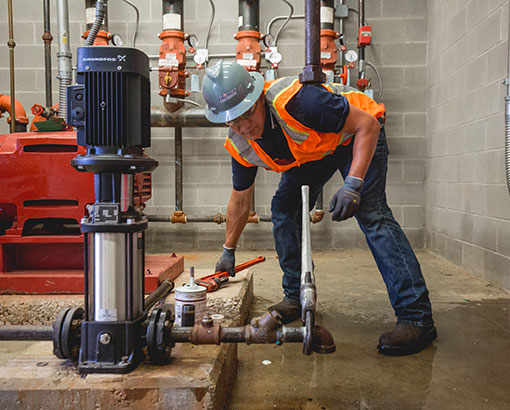Understanding the Key Components of Effective Water Filtering Systems

Importance of Water Filtration Equipment
Water purification systems play a vital function in making certain accessibility to tidy and safe drinking water by successfully eliminating contaminations and pollutants. These systems are necessary in resolving the growing problems over water quality and the potential wellness dangers connected with eating polluted water. By making use of numerous purification mechanisms such as reverse osmosis, triggered carbon, and UV sterilization, water filtering systems can successfully get rid of harmful substances like bacteria, viruses, heavy metals, and chemicals from the water supply.
Moreover, water filtering systems help to enhance the taste and odor of water by eliminating chlorine, debris, and other pollutants that can influence its high quality. Water Filtration Systems. This improvement in water top quality not only makes it extra palatable however also encourages individuals to consume an ample quantity of water daily, advertising much better hydration and general wellness
Types of Purification Elements

Physical filters are developed to literally stress out impurities from the water. These filters can be made of materials like ceramic, carbon, or perhaps sand, and they function by trapping particles larger than the filter's pores as water travels through.
Chemical filters make use of various chemical procedures to get rid of contaminants from the water. Instances consist of activated carbon filters, which adsorb contaminations, and turn around osmosis membranes, which use stress to different contaminants from the water.
Organic filters make use of living microorganisms like algae or bacteria to break down natural matter and toxins in the water. These filters are typically made use of in wastewater therapy plants or natural water filtration systems.
Comprehending the different sorts of filtering elements is critical for picking the most ideal water filtering system for particular purification demands.
Function of Sediment Filters
Debris filters play an essential duty in water filtering systems by successfully capturing strong bits put on hold in the water. These filters are generally the very first line of protection in a filtering system, eliminating bigger particles such as sand, silt, dust, and rust before the water relocates through finer filtering stages. By trapping these debris, the filters prevent them from reaching downstream parts, therefore prolonging the lifespan and performance of the entire system.
Overlooking this maintenance can lead to obstructing, lowered water circulation, and jeopardized filtering effectiveness. On the whole, debris filters are vital elements that contribute considerably to the performance of water purification systems.
Duty of Activated Carbon Filters
Playing an important function in water filtration systems, turned on carbon filters are important in removing pollutants and pollutants from the water system. These filters are designed to adsorb and catch a wide variety of contaminants, including chlorine, unpredictable organic compounds (VOCs), Homepage chemicals, and herbicides. The turned on carbon material has a huge surface area, enabling the reliable trapping of contaminants via a process called adsorption. As water goes through the filter, the triggered carbon holds and draws in onto the pollutants, making certain that the water that comes out beyond is cleaner and safer for usage.
Turned on carbon filters are very effective at boosting the preference and odor of water by lowering chemicals that can impact its quality. They are additionally efficient in getting rid of specific hefty metals like lead and mercury. Additionally, these filters can help stop the build-up of germs and algae in water, further boosting its overall quality. As a result of their flexibility and reliability, turned on carbon filters are a vital component in making certain that water is cleansed to the highest possible criteria prior to getting to customers.
Understanding Reverse Osmosis Equipments
Reverse osmosis systems are innovative water filtering systems that use an innovative process to eliminate contaminants and impurities from drinking water. These systems work by using stress to the water, compeling it with a semi-permeable membrane layer.
Additionally, reverse osmosis systems are fairly low-maintenance and can be set up under the sink or in a main purification system, offering convenient access to clean water throughout the household. Generally, understanding exactly how reverse osmosis systems function can assist individuals make educated decisions regarding their water filtration demands.
Verdict
In verdict, continue reading this reliable water purification systems are vital for making sure secure and tidy alcohol consumption water. By comprehending the feature and role of each element, people can make educated choices when picking a water filtration system.
Water filtration systems play an important role in making sure accessibility to secure and tidy drinking water by effectively getting rid of contaminants and contaminations. By utilizing various filtering systems such as reverse osmosis, triggered carbon, and UV sanitation, water filtration systems can efficiently remove harmful materials like microorganisms, infections, heavy steels, and chemicals from the water supply.
Debris filters play a crucial duty in water purification systems by efficiently catching solid fragments put on hold in the water (Water Treatment).Playing a vital role in water purification systems, activated carbon filters are critical in eliminating pollutants and impurities from the water supply.Reverse osmosis systems are innovative water purification systems that utilize an advanced procedure to get rid webpage of contaminants and impurities from alcohol consumption water